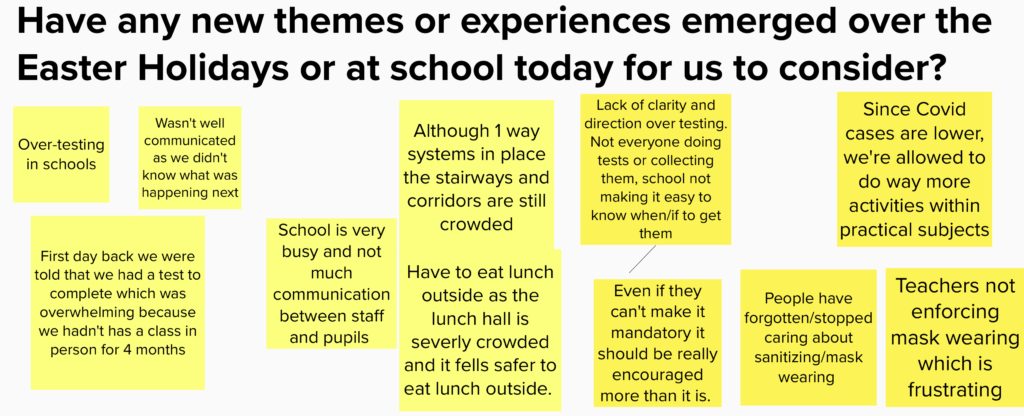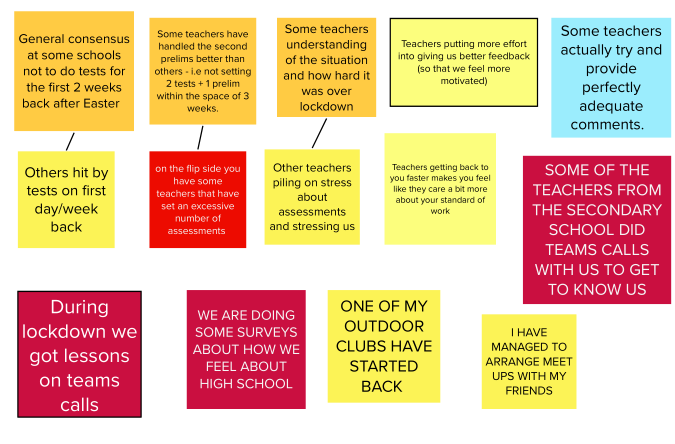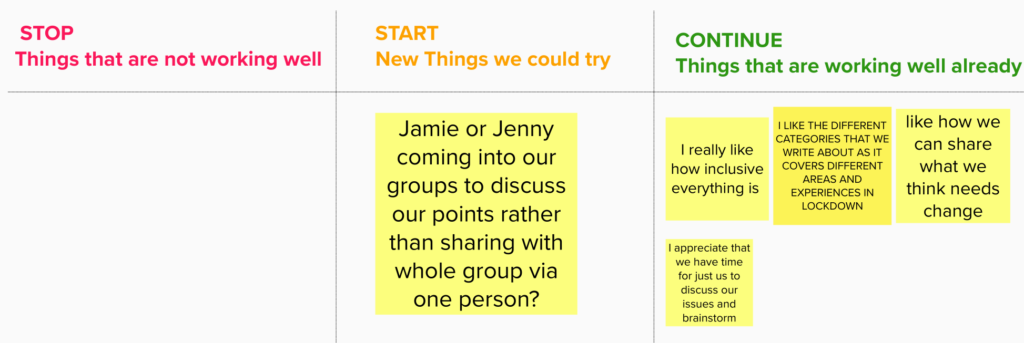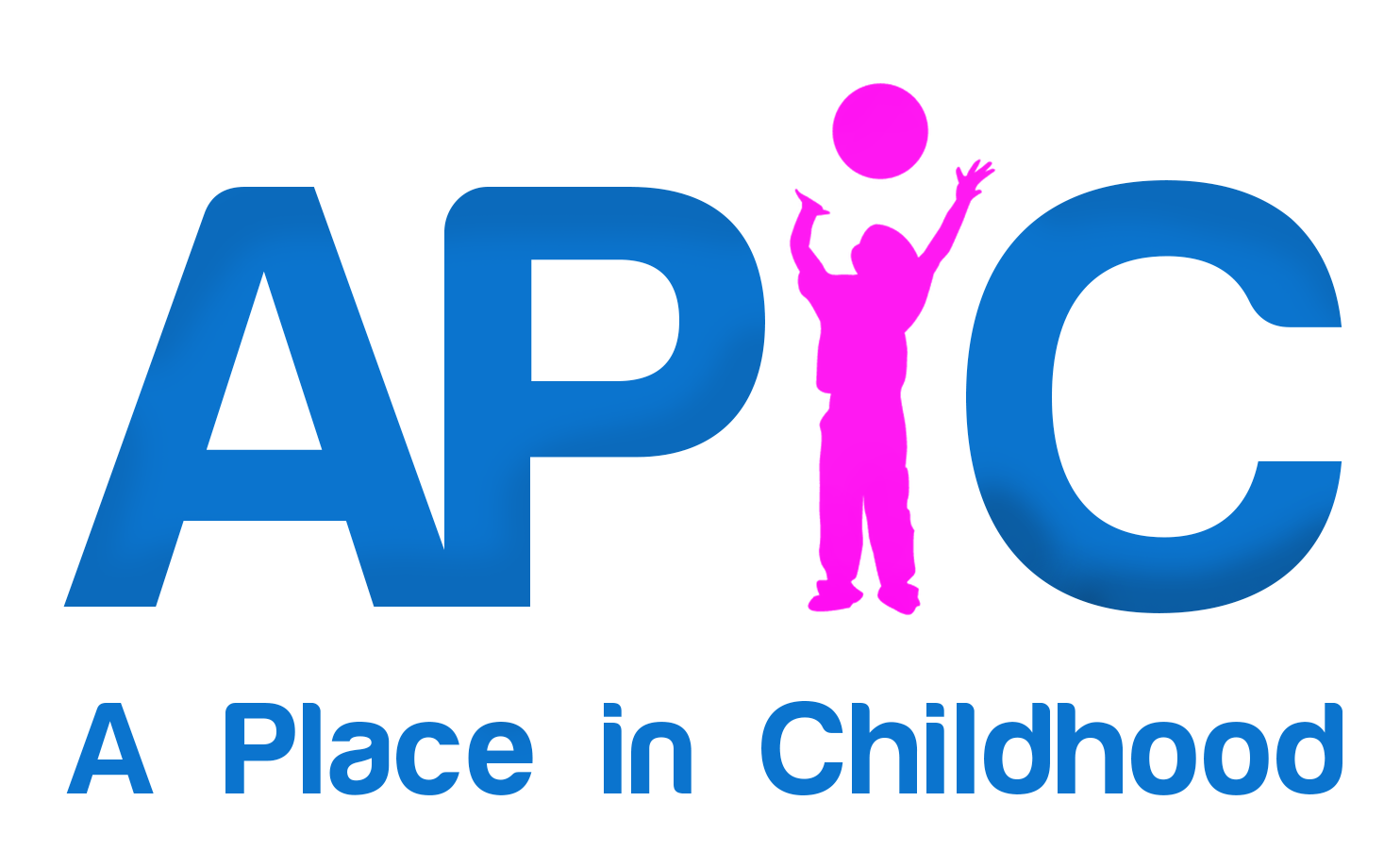Last month we resumed workshops for STAGE 2 of APiC’s COVID-19 Project with Children and Young People in Scotland. Supported by the Children and Young People’s Commissioner Scotland (CYPCS), ScotYouthandCOVID2 has recalled the Young Consultants who participated in our original project during April/May 2020.
APiC’s self-funded study in April/May 2020 was a participant- led project and report that was one of the only truly participatory projects held with children and young people at that time. It set out the important changes and challenges young Scots were experiencing, including proposed solutions. It involved teams from Aberdeen, Edinburgh, Glasgow, and (Rural) Stirlingshire and Falkirk, each with 4-6 boys and girls, aged 10-16 years. Earth in Common, the Children’s Parliament Imagining Aberdeen programme, Denny High School, Northfield Academy and Manor Park Primary School helped us with the recruitment.
#ScotYouthandCOVID2: Workshop 4
We reported in the last blog on workshop 3 how we worked with Young Consultants to sort into task force groups based on the most important themes they identified from workshops 1 and 2. These were:
- ‘Exam’ Years with High Workload and Stress
- Well-being Outside of School
- The Transition from Primary to Secondary School
- Motivation and School
- Uncertainty
- Local Issues
We reported on the initial findings and key asks around each of these themes in the last blog. The overarching and central theme is that communication and relationships really matter to children and young people.
In workshop 4, held Monday 19th April, we reflected together on how the project had gone so far, anything new that had emerged over the Easter Holidays, and within each taskforce group looked at how we might learn from best practice for developing further recommendations. We explore these new findings below.
New Themes Emerging
In the Mural below you can see the new themes and experiences highlighted by our Young Consultants, all of which relate to the return to secondary school. They key messages coming through are that:
- Some teachers are setting tests which our Young Consultants do not think is fair in the first week back and after so long without face-to-face teaching;
- School buildings feel very crowded for some and therefore unsafe; and
- Rules about COVID-19 tests, mask wearing, and hand sanitising are unclear and not always enforced.
One Young Consultant in primary school detailed how they were now doing bikeability training which was good, but strange as all activities had to take place on the school grounds rather than in the local community. Some pupils will also get less time as their school closes for the polling day 6th May which they were not sure was fair.

However, and more positively, the lower instances of Covid-19 is allowing more activities to take place within practical subjects. Young Consultants also talked about appreciating more opportunities for fun out of school activities.
Learning from Best Practice
We asked our Young Consultants what examples or experiences they had of best practice during the pandemic that we might learn from. We list the core findings below:
- Some teachers have arranged assessments to take into account the possibility of pupils being overwhelmed, given how little face to face teaching they have experienced. At some schools the general consensus is not to set tests in the first 2 weeks back.
- Some teachers put a lot of effort into giving good and detailed feedback to pupils and delivering it quickly so they understand how well they’re doing at a subject and feel included.
- For pupils transitioning between Primary and Secondary School, some have had great calls on MS Teams with new teachers that has helped them feel less worried and more prepared for the change. Some are also getting surveys to fill out to explore how they feel about moving to Secondary school so that staff can help more specifically with their worries.
- Having more outdoor clubs and activities available to socialise has helped some Young Consultants feel more in control of their wellbeing.
You can see some of these in the Mural image below

While some Young Consultants found it easy to think of best practice examples, others found it very hard because of perceiving more negative experiences over the last year or because they currently feel exceptionally stressed. As reported in previous blogs, it’s clear Young Consultants in years where exams would normally be taking place are especially struggling with uncertainty, workload, and worries about their future.
How is the Project Going?
We asked our Young Consultants what we should stop doing in the workshops, what we should start doing, and what we should continue doing. You can see in the Mural below that they noted a wish for more opportunities to present feedback in small groups rather than to the whole group. Otherwise, they were happy with how the project was panning out and the opportunities they were having to explore the key themes of their lives over the last year.

In response to the feedback, we (APiC facilitators) spoke to more task forces individually for small group feedback, and in the reflection session at the end reported back on behalf of some groups where this was their preference. Creating opportunity for more small group feedback is a priority for us in remaining workshops and we will be thinking of more ways to make this happen.
What’s Next?
Our Young Consultants have completed a lot of work showing the impact of the COVID-19 pandemic on children and young people. We have a preliminary set of recommendations reported last week, and more that have emerged from this latest workshop. We will be pulling this together in the next week into a child and young person manifesto for change to present to the new Scottish Government administration in May. We will also be looking to the longer term future in workshop 5, and what our Young Consultants would like to see happen as we recover from the pandemic. We will be posting a blog next Friday with initial insights on this.
We will be posting frequent updates from the Young Consultants over the course of the project so follow us on Twitter for updates.
Read “#ScotYouthandCOVID: Children and young people’s participation in crisis” with the new foreword by the Children and Young People’s Commissioner Scotland, Bruce Adamson.
Read our blogs covering Stage 1 of this project.
Find out about other APiC projects.
